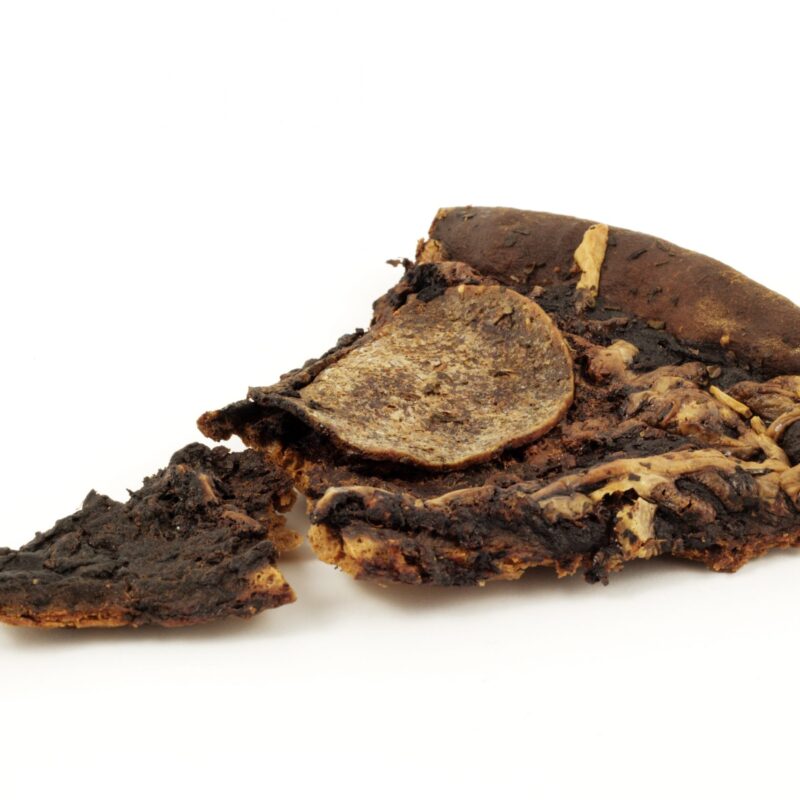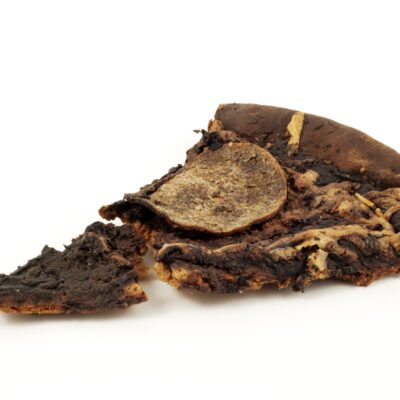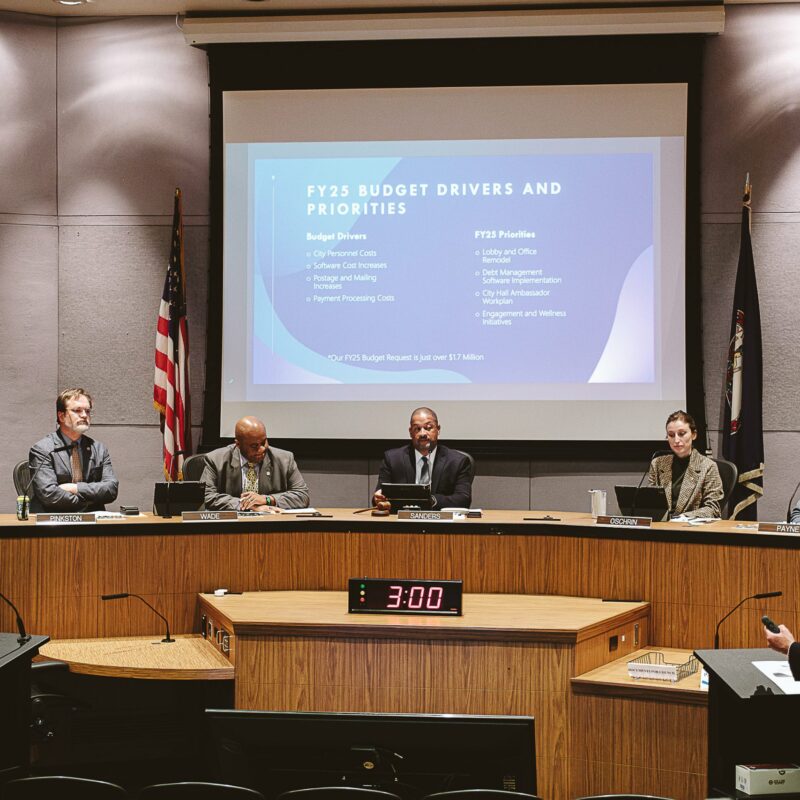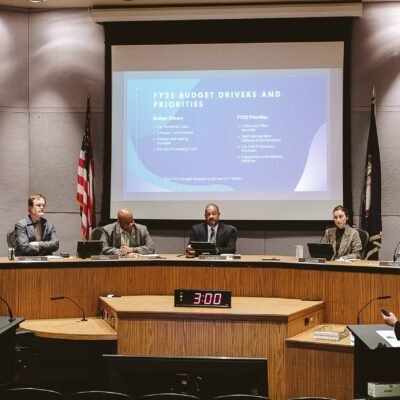Inside the warm wooden belly of the Outback Lodge, a crew of local rap musicians named Heavy Hustle Entertainment has finished its set of tunes and roams the floor in a pack, their homemade black t-shirts bearing the words "Heavy Hustle Ent." on the front and, on the back, stage names like "Big Mike" and "Young Shotti," baseball caps sporting the abbreviation or outline of their home state, Virginia.
 Terry Martin, manager of Outback Lodge, asked audiences to keep violence and rap separate during his venue’s weekly "Underground Hip-Hop Night" performance event, but after three shows attracted Charlottesville Police Department officers to the Outback’s parking lot, he was forced to cancel the remaining performances. |
| More on C’ville hip-hop:
Hip-hopsters Hip-hop record reviews from this issue: Straight Outta Compton [with video] |
They move in a messy swarm, occasionally breaking formation as one member or another hugs a girl or friend in the audience, on-hand for the November 14 performance in Outback‘s "Underground Hip-Hop Night" series. They break off into groups to speak with their manager or to go downstairs into Outback’s basement space, where a crowd of roughly 70 people gathers between live performances upstairs to dance in a circle to recorded, bass-heavy music, body to body to body. The subterranean space has held as many as 250 people for similar rap-themed dance nights, claims one person in the crowd. Sweat has poured down the mirrors behind the bar.
Onstage back upstairs, an out-of-town duo named Jigz and Bobby Capri trade verses and lyrics flows. Capri, a doughy white man with a thin chinstrap of facial hair, raps with a deliberate drawl on tunes like "Skitzo," his voice a coarse growl while Jigz, a lean and menacing body of dark skin and muscle, repeats Capri’s lyrics. "I’m a schizo," Capri shouts, echoed by his partner. "It’s so crazy, baby/ Life’s like a disco."
The crowd—mostly young black men in baseball caps, overstuffed ski jackets, baggy jeans and white undershirts—heaves back and forth in response, a few hands up, toasting the performers with drinks or fingers spread like "V"s and "A"s, a hand signal created and used by Virginia-based hip-hop musicians, something local rappers call "two up, two down," a peace sign and its inversion.
While the show rages on, three security workers rush a person out the front door of Outback Lodge onto the lawless asphalt surrounding the club. Jeyon Falsini, the promoter of the hip-hop series, would later describe the move as a sort of pre-emptive safety measure, saying simply that "someone recognized [that man] as having a warrant on him."
It is nearly midnight. Outside the Outback on the 900 block of Preston, a Charlottesville Police Department cruiser is parked and an off-duty officer stands near a few men in black t-shirts that read "OBL Security" and a black man in his 20s who stands clutching a hand that spits blood. He claims he cut it on broken glass.
Within two hours, despite the presence of so much heat, two firearms will work their way to the immediate area of the Outback Lodge. After that, Charlottesville Police will respond to calls of "shots fired." One weapon will be found on a 25-year-old convicted felon; he’ll subsequently be charged for carrying a firearm. The other will be used to pump a bullet into the leg of a 20-year-old Louisa County man, but that weapon, as of yet, hasn’t been recovered.
For nearly a month, it seemed local hip-hop was back. Or back in the clubs, at least—starting with a blistering first performance by a local rap group and ending on November 14 with a gunshot. Local hip-hop musicians have never had a consistent home in Charlottesville, and have the most to prove as a result. Yet despite a fresh new cast of characters with an arsenal of inventive tunes, rap music can’t seem to find a place in town to call its own without violent actions ultimately speaking louder than their words. Or, as Danny Shea, booking manager for the Satellite Ballroom, puts it: "They are shooting themselves in the foot by being jackasses. No pun intended."
The beat and the heat
Terry Martin knew what troubles he might face booking local hip-hop. As far back as 2001, there were reports of gun sightings and shots fired at hip-hop shows in Charlottesville, beginning with a rap concert at sushi bar and music venue Tokyo Rose when a gun sighting led to the prohibition of any hip-hop concerts at the venue. Similar events occurred as recently as April 12, when gunshots rang out behind the Satellite Ballroom during a set by eye-patched rapper Slick Rick. Neither evening ended in injury, but the incidents combined to suggest that anyone attending a rap show in town ran the risk of hearing dope rhymes as well as deafening shots.
Martin started Outback Lodge’s hip-hop dance nights around the same time, roughly seven years ago in the basement of the venue. For one night each week, hip-hop fans could take the spiral stairway just to the right of the Outback’s main entrance to the basement, a dark, red-lit space with a mirrored bar and room enough for a few hundred people to dance to rap records and CDs piped through Outback’s reputable sound system.
Martin closed the hip-hop dance event twice due to what he says were fights, the last of which took place nearly a year ago. "I stayed away from hip-hop since 2006," says Martin. "Back in the day, the gang thing wasn’t as bad. Kids were just getting into all this gangster hip-hop."
But, with the hope of providing local hip-hop fans a night of dancing and music that wasn’t available elsewhere in town, Martin reinstated the hip-hop dance nights last summer. Around the same time, local music promoter Jeyon Falsini approached Martin with the idea of coordinating a night of live hip-hop music to accompany the dance events.
Falsini, who books all genres of music at multiple venues around town, planned for the music night to serve as a trial run for a number of local rappers that he had met, a way to distinguish between wannabe emcees and committed performers. "I was beginning to build a community of musicians," says Falsini. "I’d met and gotten 30 different numbers from rappers, and calls were coming in. I was going to try out everyone and, after about 15 shows, I was going to weed out the amateurs from the pros."
By offering rap music for one night each week—Wednesdays at 10pm, with live performances and the basement dances for only $10—live, local hip-hop would claim a regular home but remain exclusive enough to keep crowds coming back to the Lodge. Musicians could perform their songs live while earning some green and some experience. Crowds could support local musicians and experience the thrill of live music in return. And, hopefully, the two parties wouldn’t shoot each other.
Falsini and Martin coordinated heightened security for the events, which debuted on October 24, and raised the age of admission to 18 years. When asked what his plans to prevent violence were, Martin simply said, "Just put more bodies in—lots of large guys that don’t mind throwing people out."
"For Wednesday [November 14], I had six guys on," he continues. "As you probably saw, they were searching [people] coming in the door so we don’t get gun play in the building."
Performers and audience members alike went through the same frisking process each Wednesday night, paying the admission fee then stepping forward to a pair of security officers that would ask everyone to spread their arms and legs then pat them down, searching for weapons.
One week before the shooting took place, Martin introduced members of a local rap crew known as the Stack Boys with these words: "We’re bringing up new talent. Keep the violence down." Then: "If you feel like doing something stupid, go down the street and do what you gotta do."
And the Stack Boys crew seemed primed to take Martin and Outback up on their generosity. During their November 7 performance, Bandana Money (Eric Slaughter, 18) and Gangsta Gill (Adonis Gilmore, 19) held the stage for more than an hour for a crowd that numbered in the 30s when they began and more than doubled during the course of the night.
"All y’all niggas from Virginia put those ‘V’s up!" Gill shouted after the second song, and the crowd responded with a pantomimed "VA" logo on their hands, branding this music and scene as their own. Falsini stood at the back of the room bobbing his head, not far from Damani Harrison, who performs under the name "Glitch" in the established local hip-hop crew, Beetnix.
"He’s been ridiculous since he was little," Harrison says appreciatively of Gill, who is frothing at the mouth, spitting lines about his sexual proficiency, rhyming, "Hit me on my cell phone/ I’m the best, I might just break your tailbone." Before the night is over, additional members of Stack Boys (as well as Harrison and another member of the Beetnix, Louis "Waterloo" Hampton) take the stage at the invitation of Bandana Money and Gill to rap, as if bestowing their blessing upon the new crew.
At the conclusion of the performance, a fistfight came close to erupting. "There was a brief altercation that was about to break out at our show," says Haans Slaughter, a 19-year-old rapper and Stack Boys member who performed on November 7 under his name "H.B." "I just told the DJ to cut the music and get security over there."
A few days after the fistfight, Falsini would chalk up the scuffle as a simple dynamic between performer and spectator, some jealousy over the power dynamic. "If you’re on stage," he says, "the audience has a beef with you."
Despite the incident, Falsini feels that the security that was arranged within the club seemed to be working. "If any fights broke out in the club, they were neutralized in seconds," says Falsini days after the shooting incident. "But when they get out to the parking lot, it’s out of our hands."
The Charlottesville Police Department responded to calls concerning violence at Outback during three installments of "Underground Hip-Hop Night," but the shooting that followed the November 14 show effectively unplugged any and all rap performances at the club. On the morning of Friday, November 16, Martin met with Charlottesville Police Chief Timothy J. Longo for an hour or so.
"I think it is fair to say that if things don’t improve, I will seek whatever legal recourse at my disposal to close the business," said Longo in an e-mail following his talk with Martin. "However, after meeting with Mr. Martin, I think he clearly recognizes his obligation to his customers and the community to ensure a safe venue."
"These kids are crazy, man," Martin said later by phone. "I’ve gotta cancel a night to keep the place open."
"I’m trying to figure out where we’re going to perform now that they shut the Outback down," says Haans Slaughter after the shooting took place and the remaining hip-hop night performances had been cancelled. "It makes it look like hip-hop brings the bad crowd, but that’s not really the case. That could have happened anywhere. It just so happened that whoever had problems bumped heads at the Outback. …That takes us back from the steps forward we took."
The flow: Stack Boys Entertainment
Twenty-one-year-old Milton Taylor, Jr., known among his hip-hop crew as "DJ Millz" or "Mil Mil," was born and raised in Charlottesville, and started making music at the age of 13. He attended Charlottesville High School, during which time he says he met most of the performers that comprise Stack Boys Entertainment, currently numbering seven (including himself): H.B., Gangsta Gill, Bandana Money, Domino/Dino (Dennis Jones, 19), Giovanni (Cedric Jones, 18), and Nix (Kyle Jackson, 19).
 |
When they began rapping, Domino, Giovanni and Nix were members of a hip-hop crew named Gotta Shot, a music collective presided over by Louis Antonio "B-Stacks" Bryant, the gun-toting drug dealer sentenced to life in prison for his leadership role in "Project Crud" and the "Westside Crew," names given to Bryant’s gang of crack dealers. When B-Stacks was arrested, Taylor took the initiative to contact the three rappers and keep them working together.
"He made noise in the street for us doing our music, you know what I’m saying?" says Taylor of Bryant. "He made the pathway. He started something and now we’re just trying to finish it."
The rest of Stack Boys came together through personal connections to other local rappers. Giovanni knew Gill and Bandana Money from Jackson-Via Elementary School and met Nix in seventh grade. Nix introduced Giovanni, who also performs under the name "P.G.," to the recording facilities at the Music Resource Center the same year. "We started going there around age 13, and did that for a few years," says Giovanni. "Me and Bandana Money’s brother was good friends through elementary school; he introduced me to Money, and we all sat down and listened to him."
"I’d never really rapped with them before," says Money, the youngest member of Stack Boys and currently a senior at Charlottesville High School. "I did this track with some other guys that ended up being on the radio, 91.9FM, and one of the members of the group called me—they were putting together a group called the ‘VA Dream Team.’"
The VA Dream Team started recording in 2005 and released a few mixtapes before changing their name to "Straight Paper Entertainment," a name that lasted until a few months ago when the seven musicians caught wind of another group using the same name.
"We had a conflict, [so] in recognition of B-Stacks, we called ourselves Stack Boys," says Giovanni. [For more on Stack Boys Entertainment, click here.]
The majority of the Stack Boys are currently unemployed; all name music as their primary focus. However, Taylor cuts hair at Cavalier Barbershop, where he also sells copies of his mixtapes (more accurately, mixed CDs filled with reimagined riffs from other songs and rhymed lyrics from members of Stack Boys). At a request, he can produce a selection of nearly 10 CDs, boasting titles such as DJ Millz: Southern Takeover Volume Three and VA’s Finest: Hate It or Love It, Volume One. The CDs come in slim cases with shabby cover art; the latter shows a picture of Taylor in a t-shirt that reads "Mil Mil," near the words "Prince of the Ville." All of the CDs have been produced during the last two years or so, and are sold in stores such as Charlottesville Players in the Fashion Square Mall as well as barbershops that serve mostly African-American customers.
In addition to printing and selling mixtapes, each member of Stack Boys operates a webpage on MySpace, an Internet site used for social networking. Each page carries a few songs by each performer, with built-in music players on each website tracking how many times each song has been played. The number of listens among the Stack Boys varies from a few hundred listens to more than 30,000 for the song "900 Block" by Bandana Money and Gangsta Gill, a reference to the block of First Street where they grew up and, coincidentally, the block number of Preston Avenue where the Outback Lodge sits (Chorus: "900 block, I’m screaming, yo./ ‘V’ to the sky, ‘A’ to the floor.")
Taylor refers to the Stack Boys’ show at Outback Lodge as their first proper gig. "We don’t really have venues that we could rent, so the Outback was really trying to help us out," says Taylor in an interview the day before the shooting occurred.
None of the Stack Boys seem fazed by the fight that broke out at the conclusion of their show, nor do they seem surprised that a gun made an appearance in the Outback Lodge’s parking lot following the November 14 concert. In an interview with Eric and Haans Slaughter following the shooting, in fact, Haans wasn’t aware that the shooting had taken place. "People don’t know how to act sometimes," says Haans. "Nothing that happened [at our shows] ever had anything to with the show or the artists themselves."
In the song entitled "Soldier" posted on Taylor’s MySpace page, Giovanni raps over a melody of chimes and snare drum beats. He opens the track by boasting in a sandpaper snarl, "Let’s get this shit clear./ I’m the shit, yeah." A moment later, DJ Millz’s beats and Giovanni’s rhymes are suddenly interrupted by the ratatat of machine guns and, at one point, the rhythmless, careless blast of a shotgun.
The effect is eerie, as if the shooting at Outback had played out on tape. Random shootings at hip-hop shows may not have anything to do with the Stack Boys, but violence seems to be in their periphery, following them and other would-be rappers like some timeless apparition that cradles a handgun the same way they hold microphones.
The remix: a new path?
Quentin "Q*Black" Walker‘s November 21 concert at the Outback Lodge was cancelled following the shooting on November 14. A few days after his planned performance date, he stops by Eppie’s on the Downtown Mall for lunch. When he steps up to order his salad and cornbread, a cashier named Eric asks him, "Show happen yet?"
 Hip-hop, and you don’t stop: Quentin "Q*Black" Walker, whose November 21 performance at Outback Lodge was cancelled following the shooting that took place the previous week, lays down vocals for a new record at VA Recording Arts Studio. "The reasons for these actions," says Walker of the history of gunplay and live hip-hop in Charlottesville, "have been exhausted." |
Walker is 22 years old, a graduate of Charlottesville High School, where he met several of the members of Stack Boys including Milton Taylor, whom he calls "Mil Mil." Walker wears thick, long dreadlocks to his shoulders, a baggy gray sweatshirt and colorful Nike sneakers; he doesn’t balance an overwhelming stage presence with shyness like some local rappers, nor does he drown his friends in self-hype. Rather, he is soft-spoken and laughs easily, a confident man.
Walker’s hip-hop story reads like divine selection, the passing of a gold-plated microphone to the young man’s hands from some immortal emcee. Walker first rapped for a crowd during a performance by hip-hop artist Wyclef Jean (a member of ’90s act The Fugees) at the University of Virginia in 2000. Fifteen years old, he was pulled onto a stage by a bouncer and urged to perform by the platinum-selling artist rather than banned from a club. He opened for underground rap icon Kool Keith at the Satellite Ballroom in 2006; for Afroman, a rapper whose sole hit was titled "Because I Got High," at a UVA fraternity house; and as the headliner at a word-of-mouth concert in September at an undisclosed location. Any time that he has performed, Walker says that crowds have been fun. "It’s not, ‘I hope such and such is there so I can fuck him up,’" Walker says between bites of his salad.
Walker is currently working on a record in the VA Recording Arts Studio on Meade Avenue rather than going the homemade, do-it-yourself-with-a-laptop approach of Stack Boys. "There are other studios that have more high-caliber equipment, but this is my first time to go into a studio with guys who not only use their equipment to improve my sound but show me how the stuff works," he says.
Walker was born in Charlottesville, but moved to Fluvanna with his family when he was young. In 1995, he moved back to town. When asked about dealing with violence in the hip-hop scene, he mentions being jumped by seven guys outside of the roller-skating rink that once occupied the Jefferson School building. "Those same people are dead now. Out of those seven, four are locked up. They don’t ever change. They don’t ‘recycle’ every seven years. It’s the same shit."
On the Outback Lodge shootings, Walker just sighs. "The reasons for these actions have been exhausted." He mentions historically all-black performance venues like the Apollo and tries to articulate how, when an African-American performs for an all-black audience, the crowd can react in a harsh manner. Walker mentions his excitement over his Outback Lodge show for these reasons.
"I was expecting it to be a predominately black crowd. And a lot of people I left off in high school I haven’t seen since 2003," says Walker. "I was getting prepared to go. Even though it was a small venue, it was a big thing, to see how people dug what I was saying."
"As an artist, you want to go to different places. Like, ‘Everybody digs me in Charlottesville, but what are these people in Kansas like? What do these people in Illinois like?’ [Performing] starts that, and that show would’ve started it for me. But now it ain’t here, so I’ve gotta do something else."
Stack Boys released the latest in their line of records on Wednesday, December 5, a double-CD album from Domino titled Money or Murder. One week before the record’s planned release, Taylor maintained that the release would be celebrated during a party in the basement of the Outback Lodge, something like Martin’s hip-hop nights or the parties he and the Stack Boys threw in high school. However, Taylor called a few days later to say that the party had been cancelled along with the hip-hop shows. The record will be released as planned, and Mills says that Stack Boys plan to release video footage from their November 7 performance at Outback Lodge in a compilation called Hood Hype Volume One. The act feels oddly like a memorial offering for the local rap group.
Mills has also put the finishing touches on Southern Takeover Volume Nine, his latest mixtape, a title that now seems almost ironic. Every record or DVD that Stack Boys release is labeled as part of a volume, suggesting a drive for success or, in the least, continuity. And, while the Stack Boys never experienced a wealth of local performance opportunities, the offer of a concert was one they jumped at—a turn of fortunes that brought a crowd that desired hip-hop to a group of performers that desired a crowd. For a short breath of time, the Southern Takeover seemed imminent. Now it will have to wait.
John Ruscher contributed reporting to this article.






